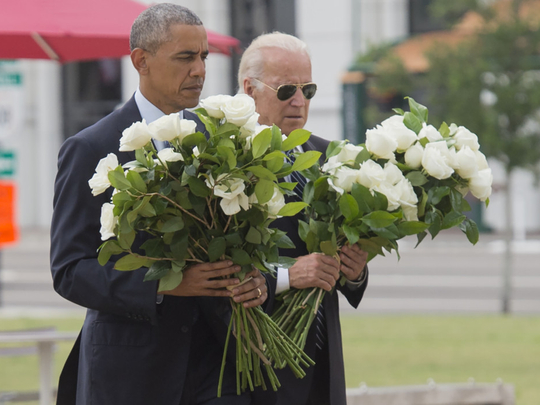
Over the next final months of his presidency, United States President Barack Obama will be preoccupied with solidifying the legacy of his administration as well as enhancing his personal image as an “exceptionally” successful US president. Domestically, that may not be a difficult task after all. Obama did indeed accomplish some of the most important social and economic reforms he had promised during his election campaign.
In the US, millions of poor Americans will be grateful for him for having the courage to fight the greed of big insurance cartels in order to provide them with the health-care facility they have always yearned for. He will also be remembered for getting Wall Street under control and rescuing the US economy from its worst economic and finical crisis since the Great Depression in 1929. Yet, on foreign policy, Obama will not leave many good memories. On the contrary, his administration will always be remembered in this regard as one of weakest and most pathetic in the history of the US (this title has so far been reserved to the Jimmy Carter administration).
Under his watch as president, Daesh (the self-proclaimed Islamic State of Iraq and the Levant) captured one third of Iraq and half of Syrian territories, posing great challenge to regional order, world peace and US interests. During his presidency also, the world witnessed the greatest humanitarian crisis since the Second World War. On Syria, the president of the world’s sole superpower and leader of the free world stood idle, watching a great disaster unfolding before his own eyes and aired live on TV screens across the globe; with hundreds of thousands of innocent civilians losing their lives and many millions getting displaced. Under Obama too, the world witnessed the resurgence of Russia. His weakness tempted Russian President Vladimir Putin to invade and annex the Crimean Peninsula without even having to think about the consequences.
These great failures in foreign policy have given critics a lot of ammunition to target the very legacy that Obama is trying to uphold. At home and abroad, his administration has been accused of rolling back American power and influence around the world. American leadership has seen a waning as a result of his timid international policies, which were widely interpreted as hesitant and failures.
Indeed, as a lawyer by profession and an eloquent orator, Obama did always have something to say in the face of these criticisms. He believes that the main challenges for the US today is to lead the world without becoming its policeman.
The US should hence avoid involvement in attempts at rebuilding every state that falls into crisis. “That’s not leadership; that’s a recipe for quagmire, spilling American blood and treasure that ultimately will weaken us. It’s the lesson of Vietnam; it’s the lesson of Iraq — and we should have learned it by now”, Obama said.
The alternative to this direct projection of American power is its “wise application”, defined by Obama as the “smarter approach” of a patient and disciplined strategy that utilises all elements of American power.
On issues of global concern, he says: “We will mobilise the world to work with us and make sure other countries pull their own weight.” Obama gave a number of examples in this regard to affirm the success of a strategy, which many see as a failure. In Syria, the US is “partnering” with local forces (meaning separatist Kurdish factions) and leading an international coalition against Daesh.
In handling Iran, the US formed an international coalition that imposed harsh diplomatic and economic sanctions, ultimately resulting in the nuclear agreement. He also refers to the Trans-Pacific Trade Agreement, the Paris Climate Change Agreement and America’s and international efforts to fight infectious diseases in Africa and elsewhere.
It is obvious that while attempting to protect his foreign policy legacy, Obama tries to exonerate himself and his administration from any responsibility for the chaos that has swept through the Middle East during his tenure. To realise that he tries to use everything he can muster, including twisted historic events. He stated: “The Middle East is going through a transformation that will play out for a generation, rooted in conflicts that date back millennia.”
This represents an official endorsement of the myth of a Sunni-Shiite conflict as lying at the heart of the matter, disregarding the fact that conflicts so-designated only became fraught and violent after his predecessor decided to invade Iraq in 2003, established sectarian power-sharing there and left Iraq prey to Iran.
If the George W. Bush administration was directly responsible for this situation, then Obama is not blameless either. He did absolutely nothing to stop the use of heavy weapons, including warplanes, tanks and missiles by the regime of Bashar Al Assad against civilians. He backed former Iraqi prime minister Nouri Al Maliki in the face of election results that favoured Ayad Allawi. He turned a blind eye to Al Maliki’s sectarian policies in Iraq and to Al Houthis in Yemen, leading to heightened sectarian tensions in the region.
These policies will always haunt the legacy of President Obama and will tarnish the image he tried to make for himself as one of the greatest presidents of the US.
Dr Marwan Kabalan is a Syrian academic and writer.










